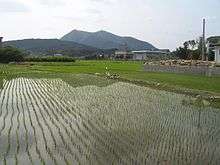Rice production in South Korea
Rice production in South Korea is important for the food supply in the country, with rice being a common part of the Korean diet. In 2009, South Korea produced 3,899,036 metric tonnes (4,297,951 tons) of rice.[1]
Rice is the most valuable crop in South Korea.[2] However, as noted by Donald S. Macdonald, rising wage levels and land values have made it expensive to produce. Rice represented about 90 percent of total grain production and over 40 percent of farm income; the 1988 rice crop was 6.5 million tonnes.[2] Rice was the imported in the 1980s, but the amount depended on the success of domestic harvests. The government's rice support program reached a record of US$1.9 billion in 1986 as compared with $890 million in 1985. By raising procurement prices by 14 percent to the 1986 level, Seoul achieved a rice price structure that was about five times that of the world market in 1987.[2]

In 2015, South Korea's rice consumption hit a record low of 65.1 kg per person, while flour consumption was the highest since 2006 at 33.6 kg, according to industry and official data.[3] The South Korean government, which is subsidizing rice production and storage, has accumulated a large stockpile of rice.[4]

References
- "FAOSTAT". Food and Agriculture Organization of the United Nations. Retrieved 18 October 2012.
- "South Korea: A Country Study:Major crops". Library of Congress, Washington D.C. June 1990. Retrieved March 21, 2009.
- "Rice off the menu: Asia's hunger for bread and pastries boosts wheat demand". Reuters. 2015-10-15. Retrieved 2015-10-30.
- May Choon, Chang (2015-11-28). "Seoul seeks ways to deal with huge rice stockpile". The Straits Times. Archived from the original on 2016-01-24. Retrieved 2015-12-08.
![]()